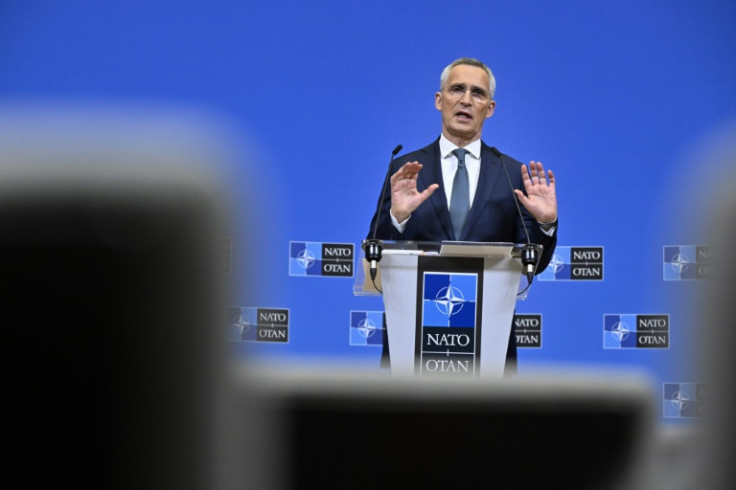NATO To Grapple With Ukraine Membership Push At Summit

NATO leaders at a summit next week will underscore a vow that Ukraine will join the alliance in the future, its chief Jens Stoltenberg said Friday, as Kyiv seeks faster progress.
Ukrainian President Volodymyr Zelensky is set to attend the two-day gathering in Lithuania to make the case that his country should join when Russia's war ends.
"I expect allied leaders will reaffirm that Ukraine will become a member of NATO and unite on how to bring Ukraine closer to its goal," Stoltenberg said.
NATO's 31 members are still haggling over the final wording for a statement on how to address Ukraine's membership.
Eastern European countries back Kyiv's calls to be granted a pathway into NATO for when the conflict ends.
But key powers the United States and Germany are reluctant to go beyond a 2008 promise that Ukraine would join one day, without setting a clear timeframe.
"The exact wording will be made public when we have agreed," Stoltenberg said.
NATO diplomats say allies could smooth Ukraine's eventual path by dropping a more formal list of conditions it would have to meet when it comes nearer to joining.
Stoltenberg said, as part of a package, NATO would tighten ties with Kyiv by launching a NATO-Ukraine Council that will sit for the first time in Vilnius, with Zelensky participating.
He said NATO's members have also committed 500 million euros ($545 million) to a multi-year programme aimed at bringing Ukraine closer to alliance standards.
To reassure Kyiv in the interim, diplomats say heavyweights the United States, Britain, France and Germany are negotiating with Ukraine over longer-term commitments to supply arms.
These would be outside the NATO framework and fall far short of Kyiv's ultimate desire to be covered by the alliance's collective-defence umbrella.
Stoltenberg said any such assurances would "complement and underpin" the work NATO is doing to bring Ukraine closer.
Russia's all-out invasion of Ukraine in February 2022 upended Europe's post-Cold War security order.
At the summit in Vilnius starting Tuesday, NATO will bolster its defence spending target and set two percent of gross domestic product as a minimum for every ally.
NATO members pledged a decade ago that they would strive towards that figure.
"Then, only three allies spent two percent of GDP on defence. This year, 11 allies reach or exceed the target," Stoltenberg said.
He said last year spending by NATO's European allies and Canada leapt by 8.3 percent -- "the biggest increase in decades".
NATO leaders are also to sign off on new defence plans in Lithuania that will detail how allies would stave off a Russian attack.
The move is part of NATO's biggest overhaul to its security in decades that is also seeing them put 300,000 troops on higher readiness.
Another issue looming over the summit is Sweden's still-unfinished bid to join due to delays from Turkey and Hungary.
Stoltenberg has convened a meeting of the Turkish and Swedish leaders on the eve of the summit on Monday to try to hammer out the differences.
Stoltenberg insisted Sweden has "delivered" on commitments to Turkey under a deal agreed a year ago that was aimed at clearing the path to accession.
"I'm also very clear that Turkey has real security concerns, and that's the reason why we are sitting down and addressing them," Stoltenberg said.
Sweden and its neighbour Finland dropped decades of military non-alignment and applied to join NATO in the wake of Russia's invasion of Ukraine.
Finland formally joined the bloc in April.
Hungary is also still holding up Sweden's membership, which requires the unanimous approval of all 31 NATO members.
But Budapest has indicated it will give way if Turkey agrees.
© Copyright AFP 2024. All rights reserved.





















